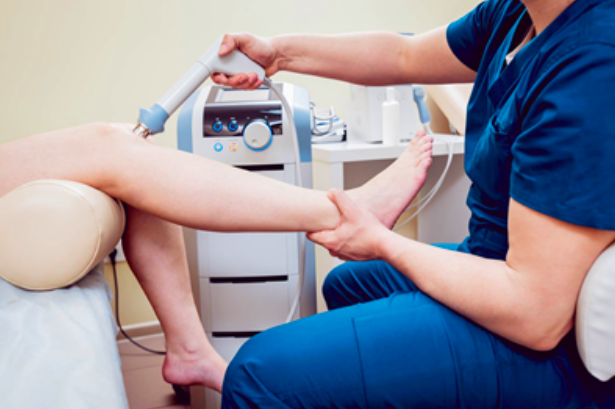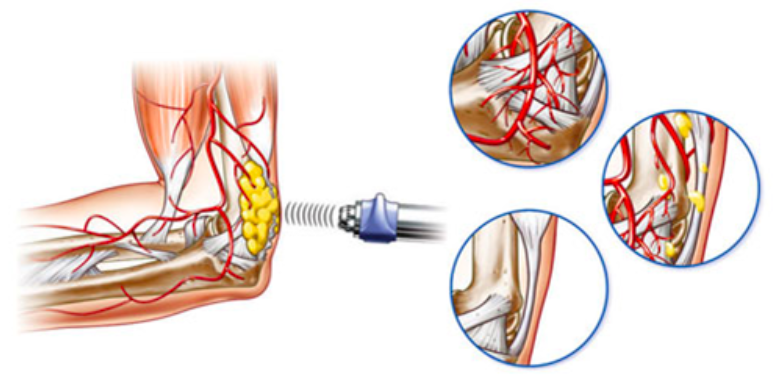What is Shockwave Therapy? How does it work?
What is Shockwave Therapy?
Shockwave therapy was originally used in urology back in the 1980s for the treatment of kidney stones, and has now found other uses in orthopaedics, physiotherapy and sports medicine over the past 21 years.

Shockwave therapy has been found to be an effective treatment for predominantly tendon injuries and orthopaedic conditions. We have successfully treated plantar fasciitis, Achilles tendinopathy and increased the length of shortened muscles. It addition to providing immediate pain relief, it has also been found to be effective for promoting tendon repair.
Shockwave therapy is a form of regenerative medicine. Shockwave therapy works by stimulating the growth of new blood vessels into the tissues, promoting growth factors, increasing cell proliferation, decreasing inflammation and mobilising stem cells.
How does it work?
Our shockwave therapy is conducted by our qualified Sports Podiatrists.
The German made Storz Shockwave machine generates high energy radial shockwaves, which are transmitted to the site of the injury through a conducting gel.
The treatment session uses 2000-4000 pulsed shockwaves into the affected area and lasts approximately 3-10 minutes. Most patients will notice some pain relief immediately after therapy. To fully restore and heal injured tendons more treatment may be needed

The body’s natural healing process continues after the prescribed course of shockwave therapy. Part of the treatment plan will also include advice on how to manage your condition and rehabilitation to strengthen the area, which will minimise the risk of re- Injury.
Up to 92% of patients report significant improvement in their tendon pain after a course of shockwave therapy.

Is Shockwave Therapy an alternative to surgery?
In terms of treatments offered, Shockwave Therapy stacks up highly against surgery – there is no risk of infection or complication, no down time and significantly reduced costs.
In a recent study of plantar fasciitis patients (1), similar results were seen with clients who had surgery and those that had Shockwave Therapy. The conclusion from the researchers was “ESWT is a reasonable earlier line of treatment of chronic plantar fasciitis before surgery”. Similar results have been reported in other studies.

Is Shockwave Therapy an alternative to steroid injections?
Steroid (glucocorticoid) injections are sometimes recommended for a number of conditions. However, with tendinopathy, the effect of cortisone injections has decreased over the past decade and could impact the tendon tissue in the long term, including cell necrosis (death) (2).
Shockwave Therapy has been shown to not have the same negative side effects with tendon tissue.
What conditions can Shockwave Therapy help with?
Tendons
• Plantar fasciitis
• Achilles tendinitis/insertional
• Jumper’s knee/patella tendinitis
• Hip bursitis/tendinopathy (Greater Trochanter pain syndrome)
• Frozen shoulder – adhesive capsulitis shoulder (3)
• Osgood Schlatter disease (5)
• Tight muscles
• Osteoarthritis of joints
Shockwave Therapy can help with the following conditions:
• Achilles Tendinopathy: Shockwave therapy trials have confirmed excellent results with decreasing pain and increasing Achilles function compared with either shockwave therapy or exercises in isolation (8).
• Plantar Fasciitis and Heel Spurs: In a recent study, the authors looked at the efficacy of eight different types of treatment for plantar fasciitis. It was concluded that shockwave therapy ranked number one for best outcome and considered “optimal treatment” (9). In another study they showed that combining shockwave therapy with a physio-guided stretching program has been proven to deliver clinically superior outcomes for plantar fasciitis sufferers (10).
• Hip – Greater Trochanteric Pain Syndrome: A randomised controlled clinical trial of 229 people showed shockwave therapy was significantly more successful than steroid injection (11).
• Shin Splints – Medial Tibial Stress Syndrome: A clinical trial showed that 40 of 47 shin splint sufferers were able to return to their preferred sport at their pre-injury level after 15 months, versus only 22 in a control group (12).
Will I need a referral for Shockwave Therapy?
No, you do not need a referral but you require an initial assessment by one of our qualified Sports Podiatrists to determine if shockwave therapy is suitable for you. Please note a GP referral is required if you’re under an EPC plan, DVA or compensable client.
If shockwave therapy is not suitable for you, we will endeavour to guide you towards another suitable treatment, or for further investigations. If we cannot provide suitable therapy, we should be able to point you in the right direction.
Leave a reply



Most Commented